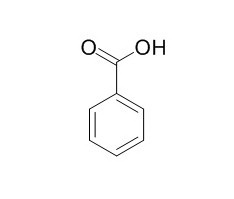Benzoic acid
Benzoic acid is a colorless crystalline solid and a simple aromatic carboxylic acid, used as a food preservative. Benzoic acid can improve feed efficiency and diarrhoea, and improve gut microfloral composition.
Inquire / Order:
manager@chemfaces.com
Technical Inquiries:
service@chemfaces.com
Tel:
+86-27-84237783
Fax:
+86-27-84254680
Address:
1 Building, No. 83, CheCheng Rd., Wuhan Economic and Technological Development Zone, Wuhan, Hubei 430056, PRC
Providing storage is as stated on the product vial and the vial is kept tightly sealed, the product can be stored for up to
24 months(2-8C).
Wherever possible, you should prepare and use solutions on the same day. However, if you need to make up stock solutions in advance, we recommend that you store the solution as aliquots in tightly sealed vials at -20C. Generally, these will be useable for up to two weeks. Before use, and prior to opening the vial we recommend that you allow your product to equilibrate to room temperature for at least 1 hour.
Need more advice on solubility, usage and handling? Please email to: service@chemfaces.com
The packaging of the product may have turned upside down during transportation, resulting in the natural compounds adhering to the neck or cap of the vial. take the vial out of its packaging and gently shake to let the compounds fall to the bottom of the vial. for liquid products, centrifuge at 200-500 RPM to gather the liquid at the bottom of the vial. try to avoid loss or contamination during handling.
Cancers (Basel).2021, 13(17):4327.
ACS Nano.2018, 12(4):3385-3396
J Ethnopharmacol.2017, 197:157-164
ACS Food Sci. Technol.2023, 3(2):273-282.
Biotechnol Bioeng.2020, 117(7):2198-2208.
Proc Natl Acad Sci USA.2016, 113(30):E4407-1
Food Sci Nutr.2019, 8(1):246-256
The Japan Society for Analy. Chem.2017, 66(8):613-617
Plants (Basel).2024, 13(19):2793.
J Neuroinflammation.2023, 20(1):268.
Related and Featured Products
Asian-Australas J Anim Sci. 2015 Jun;28(6):827-39.
Effects of benzoic Acid and thymol on growth performance and gut characteristics of weaned piglets.[Pubmed:
25925060]
A total of 144 weaned crossed pigs were used in a 42-d trial to explore the effects of different concentrations/combinations of Benzoic acid and thymol on growth performance and gut characteristics in weaned pigs.
METHODS AND RESULTS:
Pigs were randomly allotted to 4 dietary treatments: i) control (C), basal diet, ii) C+1,000 mg/kg Benzoic acid+100 mg/kg thymol (BT1), iii) C+1,000 mg/kg Benzoic acid+200 mg/kg thymol (BT2) and, iv) C+2,000 mg/kg Benzoic acid+100 mg/kg thymol (BT3). Relative to the control, pigs fed diet BT3 had lower diarrhoea score during the overall period (p<0.10) and improved feed to gain ratio between days 1 to 14 (p<0.05), which was accompanied by improved apparent total tract digestibility of ether extract, Ca and crude ash (p<0.05), and larger lipase, lactase and sucrose activities in the jejunum (p<0.05) at d 14 and d 42. Similarly, relative to the control, pigs fed diet BT3 had higher counts for Lactobacillus spp in digesta of ileum at d 14 (p<0.05), and pigs fed diets BT1, BT2, or BT3 also had higher counts of Bacillus spp in digesta of caecum at d 14 (p<0.05), and lower concentration of ammonia nitrogen in digesta of caecum at d 14 and d 42 (p<0.05). Finally, pigs fed diet BT3 had higher concentration of butyric acid in digesta of caecum at d 42 (p<0.05), and a larger villus height:crypt depth ratio in jejunum and ileum at d 14 (p<0.05) than pigs fed the control diet.
CONCLUSIONS:
In conclusion, piglets fed diet supplementation with different concentrations/combinations of Benzoic acid and thymol could improve feed efficiency and diarrhoea, and improve gut microfloral composition. The combination of 2,000 mg/kg Benzoic acid+100 mg/kg thymol produced better effects than other treatments in most measurements.
Pestic Biochem Physiol. 2014 May;111:38-42.
Steric hindrance of 2,6-disubstituted benzoic acid derivatives on the uptake via monocarboxylic acid transporters from the apical membranes of Caco-2 cells.[Pubmed:
24861932]
Benzoic acid is a typical substrate for monocarboxylic acid transporters (MCTs), and easily taken up from the apical membranes of Caco-2 cells by MCTs. However, some Benzoic acid derivatives were sparingly taken up by Caco-2 cells. To elucidate the mechanism of lower uptake of the derivatives, we investigated the effect of substitution of benzene ring on the uptake by MCTs using Caco-2 cells.
METHODS AND RESULTS:
Among the Benzoic acid derivatives tested, the uptake of 2,6-disubstituted Benzoic acids was markedly lower than that of other Benzoic acids. Co-incubation of the 2,6-disubstituted derivatives with Benzoic acid did not decrease the uptake of Benzoic acid, while co-incubation with other derivatives significantly decreased the uptake of Benzoic acid. Kinetic analyses elucidated that the uptake of 2,6-dichloroBenzoic acid and 2,3,6-trichloroBenzoic acid did not involve the carrier-mediated process.
CONCLUSIONS:
The 2,6-disubstitution of Benzoic acid may prevent the access of carboxylic acid group to MCTs expressed on the apical membranes of Caco-2 cells.



